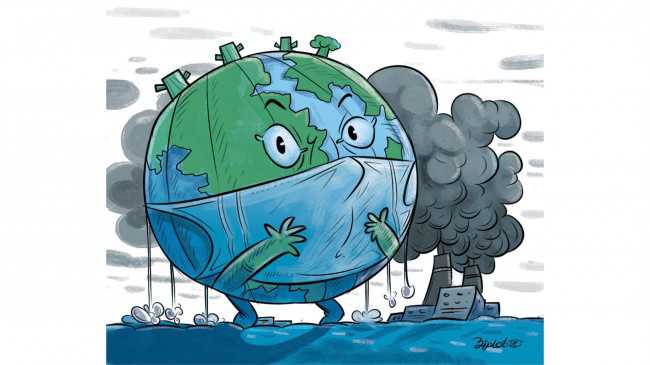Pursuing climate actions in the Bangladesh apparel industry

Image: Collected
Many of us will have heard the account of the boiled frog. Legend offers it that if you set a frog in a pot of boiling normal water, it will quickly leap out. But if you place it in a pot filled with pleasantly tepid normal water and little by little heat it, the frog will remain in the water until it boils to loss of life.
A parallel to this could be drawn with the global task we have now face around climate change. We seem to be to be sleepwalking right into a disaster of our own making. Every year that passes, we hear the same speeches, the same discussions. But we continue to make the same mistakes, placing targets which absence ambition and urgency and bringing easy and simple possible road.
As citizens and businesses of the world, we've extracted the earth's natural resources at an alarming fee. According for some estimates, we now consume natural resources at a rate that's 1.7 times greater than they are being regenerated. That is thanks to population progress and the disposable contemporary society in which we live.
Through the recent virtual Climate Transform Ambition Summit, Antonio Guterres, Secretary-General of the US, expressed his dread that the global heat range may rise simply by up to three degrees Celsius if countries belonging to the G-20 cannot drastically reduce their particular emissions. We know a global temperature increase of just one single degree Celsius would bring about an overwhelming environmental hazard. What would happen if temperature ranges rose by three degrees Celsius? Specifically in countries such as Bangladesh, which were identified as vunerable to climate impacts?
Many countries owned by the Global North have previously strengthened their climate response agenda to handle climate change. THE UK, Canada and Japan possess pledged to attain carbon neutrality and net-zero emissions by the finish of 2050. Joe Biden, today's US President, provides signed an executive buy to have the United States rejoin the Paris Arrangement. In Asia, India and China possess vowed to decrease a significant portion of carbon emissions by 2030. China envisages decreasing its carbon emissions by at least 65 percent by the end of 2030. India too is on track to reduce carbon emission to 37-39 percent below its 2005 levels.
The United Nations Climate Action Approach outlines an enormous transformation of operations to realize a 45 percent reduction in carbon emission and an 80 percent sourcing of electricity from renewable energy by 2030. In this regard, Bangladesh is rolling out a Nationally Identified Contributions (NDC) document following UNFCCC guidelines beneath the Paris Agreement.
However, the NDC simply articulates a mandate of reaching at least ten percent of total ability generation from renewable strength sources simply by 2030. The recent 2021 database of electricity technology mix reveals that simply 3.22 percent of it is derived from renewable options. What these figures present is that there exists a sharpened disconnect between our countrywide mandate and the global mandate.
We need to address this, as a region and garment industry. We can not afford to overlook the various global climate pledges, because our biggest RMG export markets lie in Europe (60 percent), USA (18 percent) and Canada (four percent).
To keep tempo with global buyers, it is crucial that the climate targets in Bangladesh are aligned with ambitious targets globally. We should lead, not follow, on this issue and become proactive, not really react when things are too late.
There are other factors at play. Our federal government has got prioritised Bangladesh's LDC graduation by 2024 in the Eighth Five Year Plan (FYP). THE PROGRAM has a heavy give attention to climate transformation and environmental sustainability. Seem closely at the program and it is apparent that its success-our capability to meet national environment goals-largely is determined by the private sector. Which means investment in latest, green technology from our RMG market. Is the funds there for the purchase? Can factories access the required investment collateral?
Source: https://www.thedailystar.net
Previous Story
- Task applications under Canada pilot program starts, might...
- Government should get started inclusive negotiations for retaining...
- Moving abroad: countries people want to live in...
- De Havilland Canada Delivers Dash 8-400 Aircraft to...
- NBR advises against deal in case Bangladesh has...
- Bangladesh praying for trade benefits post LDC graduation
- Tourism numbers plummet in second quarter
- Canada deserves our vote in UNSC